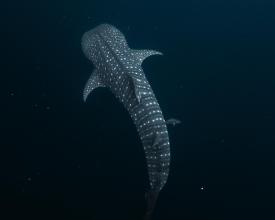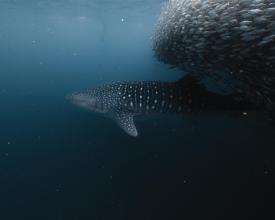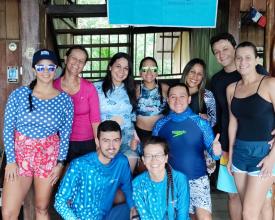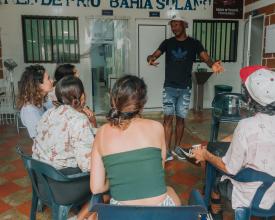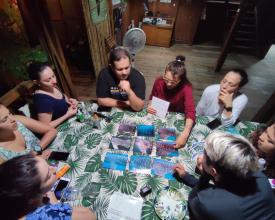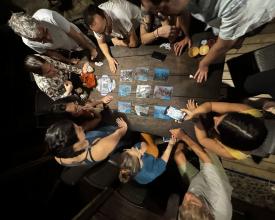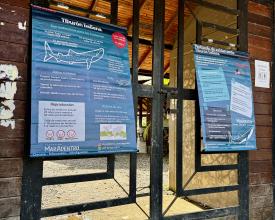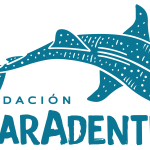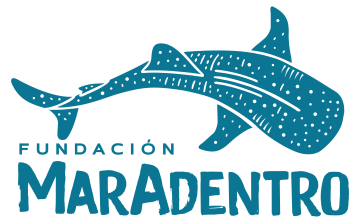
Campamento tiburón
MarAdentro is a scientific foundation, established in 2021 in Bahía Solano, focused on marine conservation with a mission to promote scientific advancement to enhance marine protection, through science, education, and outreach. A key component of its mission is “Shark Camp”, a project initiated in collaboration with the local tourism agency, Bahía Solano me llama. During whale shark season in Colombia, tourists and visitors can participate in a week-long excursion with the Foundation's scientific team, allowing them to gain a deeper understanding of the fundamental principles, objectives, and methodologies of shark research.
This initiative is twofold. First, it seeks to provide financial support for the scientific research carried out by the MarAdentro Foundation, it also aims to raise awareness and reduce the stigmatization of sharks as a dangerous species, thereby fostering the establishment of additional alliances for the conservation of shark species.
Contexto
Défis à relever
Environmental factors: The conservation of sharks is impeded by the negative perception that many people have of these species. This negative perception hinders their protection, thereby highlighting the need to understand the dynamics and threats they face. This is why it is essential to work with the community, promoting conservation through education and scientific outreach.
Social factors: Building trusting ties with artisanal fishermen, local communities, and the tourism sector has been crucial to establish and strengthen collaboration for shark research and conservation. Raising awareness among both locals and tourists about responsible shark sighting practices and the economic and social value of artisanal fishing, remains a key challenge.
Economic factor: Marine research is costly and funding depends largely on the participation of tourists in " Shark Camp", which helps cover the expenses of the sea outings, necessary for the collection of scientific data on sharks.
Ubicación
Procesar
Resumen del proceso
Linking scientific and responsible tourism, outreach, environmental education, conservation and artisanal fisheries is a complex, but essential coordination process to encourage action and funding, thereby continuing to generate knowledge about whale sharks. This is a fundamental way to create sensitivity and awareness among local communities and visitors about the need to reduce pressure on the species.
Bloques de construcción
An immersive experience of “being a researcher for a week”.
Scientific tourism constitutes the primary activity of the initiative. Over several days, visitors from various regions of the country and the world engage in scientific research focused on data collection for whale shark conservation. A variety of activities are designed to encourage dialogue, reflection, and learning about the experiences of the day, aiming to raise awareness and inspire attendees to share knowledge within their communities.
Factores facilitadores
A crucial factor in the success of the initiative is the alliance with the local tourism agency, Bahía Solano Me Llama, in terms of logistical organization, activity planning, visitor registration, and other associated activities.
In addition, establishing connections with the local community, particularly those engaged in artisanal fishing, has enabled the expansion of the initiative's scope and the dissemination of sustainable fishing practices, responsible consumption, and responsible tourism.
Lección aprendida
Adopting a simplified scientific perspective is advantageous for effectively communicating with non-scientific audiences, making academic language more accessible. This approach enables knowledge exchange and promotes understanding of the project as an opportunity for conservation. It is also essential to transform the dissemination of knowledge into an enjoyable, simple, and engaging activity.
Talks include didactic material and use photographs and videos to enhance participation and immersion . These sessions are structured to foster questions, exchange and dialogue, thereby eliminating the conventional instructor-student dynamic. Following the sightings and research sessions, participants share their field observations to enhance collective knowledge. It is important to acknowledge the involvement of fishermen and local community members in the educational process. They act as educators and disseminators of traditional knowledge, particularly regarding best practices and responsible fishing. Consequently, they assume the role of "conservationist leaders".
Responsible code of conduct for whale sharks (Rhincodon typus) responsible tourism.
This protocol is contained in Resolution 0841 of 2024, issued by the Corporación Autónoma Regional para el Desarrollo Sostenible del Chocó (Codechocó), which seeks to define behavioral actions and establish measures for responsible whale sharks tourism (including other species) to safeguard their welfare. It is aimed at fishermen, tourists and the community in general.
Measures include the number of boats allowed with a shark or group of sharks at the same time, the maximum time and minimum distance, the mandatory use of life jacket and the carrying capacity of the area. It also prohibits feeding sharks, swimming near them, free-diving, and throwing garbage in places not designated for it.
Factores facilitadores
In addition to drafting the protocol, which was subsequently approved and adopted by Codechocó, the initiative also developed an outreach strategy in which infographics (digital and printed) were designed that summarize the main guidelines of the protocol and the ecological characteristics of whale sharks, highlighting the importance of protecting the species. This material is used to support education and outreach activities (e.g. workshops, lectures) involving fishermen, local communities, tourists and tour operators.
Lección aprendida
The main contribution of this tool has been changing the behavior of tour operators, visitors, fishermen, and the community at large to adhere to these minimum measures for the protection and conservation of whale sharks. This shows a considerable degree of effectiveness and receptiveness to this type of measure, as well as the creation of positive perceptions of a scientific, responsible, and conservation-oriented tourism model.
Impactos
The Shark Camp initiative has been instrumental in promoting responsible tourism, ensuring compliance with the rules and protocol for responsible whale shark watching. This has contributed to a change in people's behavior and perspective towards nature-based tourism, while raising awareness about whale sharks protection.
- Visitors are made aware of good practices and sustainable fishing through tours of the fisheries centers and the fish market. Artisanal fishing is one of the primary sources of income for the Bahía Solano community. Visitors are encouraged to understand and appreciate the importance of artisanal fishing and responsible consumption, which are key to ensuring the sustainability of marine ecosystems.
The generation of income and capacity-building for community tourism, including services such as lodging, food, guides, transportation, has enabled the community to position itself as a model of responsible tourism practices.
- The involvement of camp participants in whale shark research and conservation efforts has been notable. This commitment reflects growing support for initiatives that contribute to environmental and marine conservation.
Beneficiarios
Camp participants learn about whale shark research and conservation through hands-on activities. The initiative supports local tourism and artisanal fishermen, recognizing their social and economic importance.
Objetivos de Desarrollo Sostenible
Historia
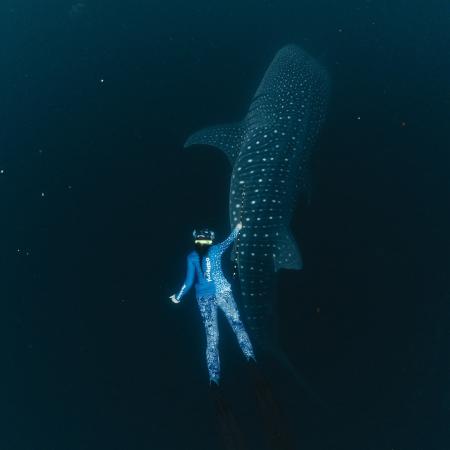
Scientific work has remained disconnected from the local realities of many territories and their communities. For Melany Villate, PhD in marine biology, founder and scientific director of MarAdentro, this was evident in 2015 when she arrived in Bahía Solano, Chocó. This is one of the most biodiverse regions in Colombia, where she has been focusing on whale shark research for the last decade.
"From the beginning of my scientific career, I became aware that scientific information is published in academic journals, however, this information rarely translates into concrete actions for conservation. My experience in Chocó has been a learning journey. Although I never studied pedagogy or environmental education, my work with fishermen became a school. They taught me how to translate scientific language into one that resonated with their experiences, needs and concerns. Science becomes tangible when it connects with the human side of conservation."
In 2021, Melany founded the MarAdentro Foundation, from which she manages several initiatives that go beyond species research. One of these is “Shark camp”, an alliance with the local tourism agency Bahía Solano Me Llama. Her vision was to bring together science, tourism and artisanal fishing to make conservation a bet in which the roles of people are reconsidered based on the construction of more equitable relationships.
"This relationship with the community has been fundamental. I learned how to communicate and build bridges between science and people's daily lives. Sharing knowledge is not always taught in classrooms and my growth has come from this direct interaction. Fishermen, in their wisdom, showed me that conservation is not just an academic subject, but a collective effort where every voice counts. The Shark camp experience taught me that for conservation to be effective, it must involve those who depend on the sea, ensuring that their needs and knowledge are incorporated into conservation strategies. This approach not only enriches our understanding, but also strengthens the mission to care for and preserve the ocean for future generations."

